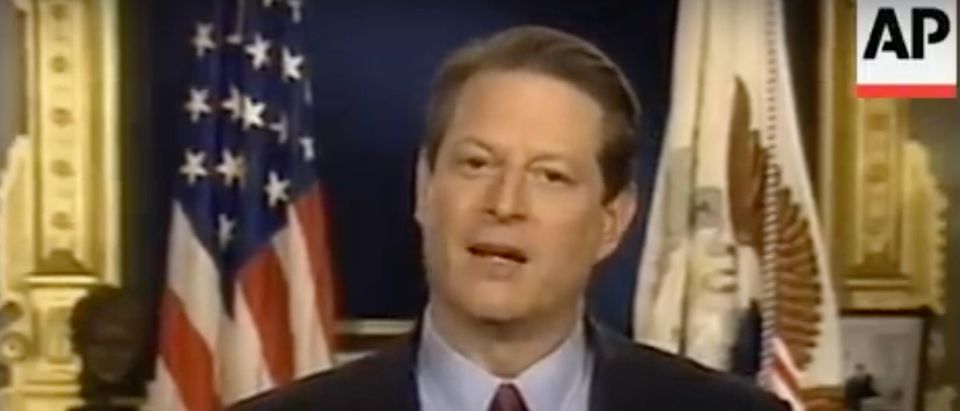Nearly twenty years ago, former Democratic Vice President Al Gore offered his concession to Republican President George W. Bush.
Prior to the numerous legal challenges that have sprung from the 2020 presidential election, 2000 was the gold standard for contentious partisan battles extending long past Election Day.
But 36 days after Americans went to the polls, the Supreme Court ruled in Bush’s favor — and Gore offered his polite concession, calling for an end to the bickering in the name of uniting the country behind his opponent. (RELATED: Al Gore Tells CNN Trump Is The Face Of Global Climate Denial)
WATCH:
Gore began with a joke, referencing his initial concession phone call to Bush — which he rescinded an hour later when questions were raised about the vote count in the state of Florida.
“Just moments ago, I spoke with George W. Bush and congratulated him on becoming the 43rd president of the United States,” he said, adding, “And I promised him that I wouldn’t call him back this time.”
Gore immediately pivoted to say that his next job was to do whatever it took to heal the divisions of the campaign, citing Stephen Douglas’ concession to Abraham Lincoln in 1860. “Partisan feeling must yield to patriotism. I’m with you, Mr. President, and God bless you,” Douglas told Lincoln.
“Well, in that same spirit, I say to President-elect Bush that what remains of partisan rancor must now be put aside, and may God bless his stewardship of this country,” Gore continued. “Neither he nor I anticipated this long and difficult road. Certainly neither of us wanted it to happen. Yet it came, and now it has ended, resolved, as it must be resolved, through the honored institutions of our democracy.”
Gore made it clear that he did not agree with the Supreme Court’s ruling, but that he accepted “the finality” of the decision and would not allow that to stand in the way of his support for his country — and its new president.
Warning Americans not to allow the divisiveness of the campaign to “hamper” Bush’s ability to govern, Gore addressed the larger global community s well. “And I say to our fellow members of the world community, let no one see this contest as a sign of American weakness. The strength of American democracy is shown most clearly through the difficulties it can overcome,” he said.
Gore concluded with his one regret: “That I didn’t get the chance to stay and fight for the American people over the next four years, especially for those who need burdens lifted and barriers removed, especially for those who feel their voices have not been heard. I heard you and I will not forget.”
His message throughout it all, however, was a call for unity. That unity, he explained, did not have to come at the cost of deeply held beliefs but in addition to them.
“While we yet hold and do not yield our opposing beliefs, there is a higher duty than the one we owe to political party. This is America and we put country before party. We will stand together behind our new president,” he explained.


